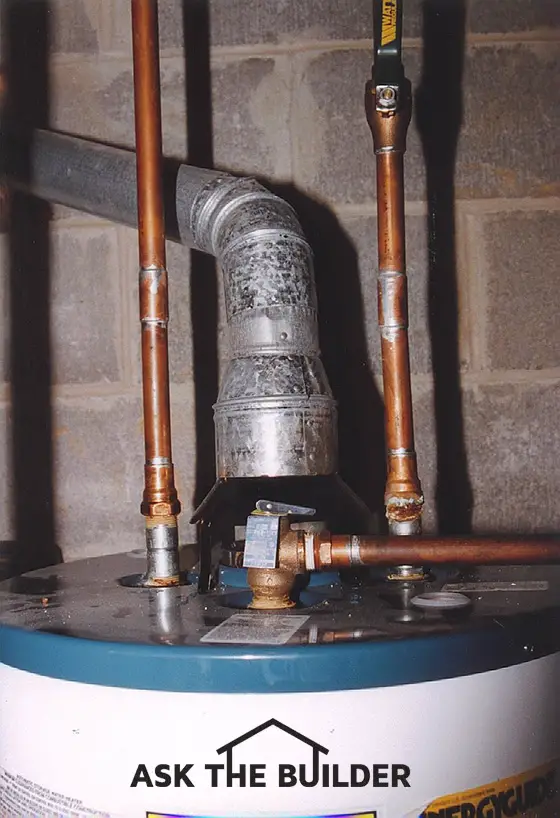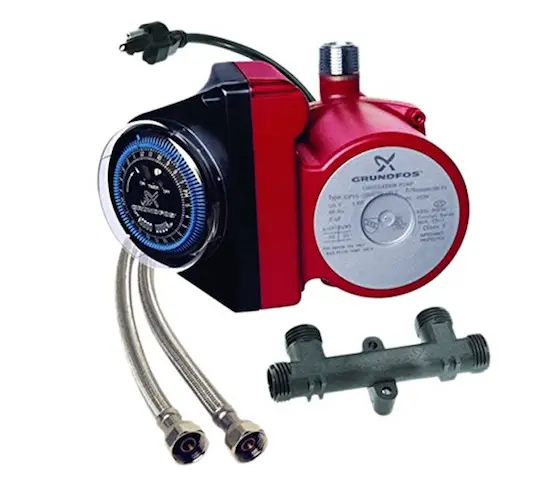Gravity Hot Water System

Gravity hot water system | This is the top of a gas water heater. The hot water leaves the tank on the left side. The recirculating loop pipe re-enters the tank down at the drain valve below.
Gravity Hot Water System TIPS
- Easy to install in ranch homes with a basement or crawl space
- Works using the magic of convection - no electricity or pump needed
- WATCH the alternative pump video below
- Enjoy hot water instantly at all fixtures
- CLICK HERE to Get Tim's FREE & FUNNY Newsletter!
Gravity Hot Water Recirculating System
"A gravity hot water system works because the heated water, which is lighter, rises through the loop. As the water cools at the end of the loop where the last part of the loop is not insulated, it is thermo-siphoned back into the hot water heater."
DEAR TIM: I am not a big fan of cold showers. I have to wait 15 - 20 seconds each morning for hot water to arrive in my shower.
It seems like a terrible waste of water and money. Is there a way to avoid this?
Can something be done to my ranch house? Is it possible for a DIY'r to accomplish the remedy? H. O.
DEAR H.O.: Brrrrrr! I know the feeling.
Cold Showers Not Acceptable
Cold showers are a bummer. Guess what? We can solve your problem with a simple gravity hot water recirculating loop. They're effective, inexpensive and easy to install.
Do You Waste Water?
First, however, I want to put into perspective the waste situation. Clean water is a natural resource and should not be wasted if you're getting it from a municipal water system.
Until your loop is operational, why not capture the shower water with a bucket? Use it to water plants or to fill your washing machine.
Free & Fast BIDS
What is the Actual Cost of Wasted Water?
The cost of the wasted water is minuscule. Let's assume you pay only 1.5 cents for each cubic foot of water (that was my rate when I wrote this column).
If you have 25 feet of 3/4 inch water pipe between your hot water heater and the shower, you waste .076 cubic feet of water each morning or $0.001178.
It would take 849 showers for you to waste $1.00 worth of water. Keep that in mind if you choose a fancy way to solve your problem.
Recirculating Pump Alternative
If you don't want to install the actual loop and want hot water at your plumbing fixtures instantly, you can install a nice pump that does what a gravity loop will do.
These pumps work on timers and move hot water through the system when you think you'll need it. They have a special valve that connects under a sink so there's NO WATER WASTE.
The cooled water in the hot water line is pumped back into the cold water line as soon as the pump fires up. When hot water reaches the special bypass valve the valve shuts off so hot water is not wasted.

This is a reliable recirculating pump you can install on top of your water heater. The weird threaded fitting goes under the sink that's farthest away from the pump. CLICK THE IMAGE NOW TO ORDER THIS PUMP.
Recirculating Pump Video
Watch this short video to show where the pump is installed and the special bypass valve.
Customer Reviews About My Gravity Loop
"I phoned you about my gravity loop that I recently installed. You clearly indicated what I did wrong. I had the theory and connections right, but the wrong pipe size. I used 1/4 inch copper tubing for the return loop. As you know, it did not work. Per your information, I increased it to 3/4 inch pipe. You said 1/2 inch might work, but I didn't want to take the chance. Bingo! - It works beyond what I had hoped for - Instant Hot Water." Bob Chartier, Westland, MI
CLICK HERE to set up a phone call with master plumber and founder of AsktheBuilder.com - Tim Carter!
# # #
"I remodeled about a year ago and read this column on gravity loops. We installed the loop and it works fantastically. There is instant, well almost, hot water on the far end of the house. I would not have believed something so simple could work so well....." Paul Wiegert
Are Recirculating Loops a New Idea?
Hospitals, hotels, motels, and other large buildings have used hot water recirculating loops for years. Some of these loops use electrical recirculating pumps while others use gravity.
Based upon the fact that your water heater is in the basement of your home, Mother Nature is going to do the work for free!
How Does the Gravity Hot Water System Work?
A gravity hot water system works because the heated water, which is lighter, rises through the loop. As the water cools at the end of the loop where the last part of the loop is not insulated, it is thermo-siphoned back into the hot water heater.
The water enters the bottom of the heater at the drain valve inlet. This flow of water is slow but constant.
Where Must the Water Heater Be Located?
The water heater must be located at the bottom of the loop. Ranch houses and two-story houses with basements are perfect candidates. Houses built on slabs or that have hot water lines below the water heater must use a simple in-line recirculating pump.
Finish The Loop
All you need to complete your loop is a return water line from the far end of your hot water line. Locate the end of your existing hot water line.
Cut into the pipe at this location where the pipe in the basement turns up to go into the fixture on the first floor. Install a tee fitting in place of the 90-degree fitting.
One part of the tee will allow you to reconnect to the hot water line. The other portion of the tee fitting will be the start of the return loop back to the water heater.
IMPORTANT TIP: Do not decrease the size of the return loop pipe. The system will work best if you use 3/4-inch diameter pipe. One-half-inch tubing may work, but don't take the chance.
Drain Water Heater
Turn off your water heater's power supply before you start this project. This is especially true if you heat water with electricity. If a heating element is on and not surrounded by water in the tank, it immediately burns up.
Then turn off the water leading to the water heater. Drain the hot water heater and remove the drain valve by turning counterclockwise.
Remove Drain Valve - Install Tee and Boiler Drain
Install a dielectric union or insulating nipple in place of the valve. This will to reduce corrosion possibilities if you are working with copper or galvanized iron water lines.
The next step is to install a tee fitting at the base of the heater. The loop pipe connects to one part of the tee and you'll install a new boiler drain out of the other part so you can drain the heater in the future.
Insulate 98% Of The Loop
To save energy and have the loop function, you must insulate the loop as it leaves the top of the water heater. The insulation must start inches above where the hot water line leaves the water heater and must continue along the entire loop as it makes its way through the house and starts its trip back to the water heater.
In new construction, insulate all of the hot water supply pipe up to each fixture.
Last 15 Feet - NO INSULATION
Do not insulate the last 15 feet of pipe as it gets near the heater. This pipe must be uncovered so the water cools. This cooling of the water is what powers the gravity convection engine that makes the hot water flow slowly towards through the loop.
Foam insulation is available which will slide over the pipe as you install it. You can also choose to use pre-molded fiberglass with a protective coating. The foam insulation is much more user friendly. Remember, to ensure good performance leave insulation off of the last 15 feet of loop piping as it returns to the heater.
Flapper Check Valve
If the loop fails to work, water may be flowing backward through the system from the water heater. You can stop this with a check valve. Install a check valve in the uninsulated part of the loop about 5 feet away from the bottom of the water heater.
You MUST use a flapper-type check valve, not a spring-loaded one. Spring-loaded check valves will not work and block the slow trickle of water through the loop.
Drill a 1/8-Inch Hole
Drill a 1/8 inch hole through the flapper so that a small amount of water can flow back to the heater to maintain circulation of the water within the loop. If the loop doesn't seem to work well, slowly increase the diameter of this hole but do not exceed 1/4 inch diameter. It's important to realize this hole must be drilled or there's a very good chance your loop line will rattle and clank. The rattle happens because the flapper starts to vibrate back and forth in response to the demand for hot water. The pressurized water in the loop is trying to flow backwards but the flapper springs shut.
The small hole stops the chatter because water can flow both ways through the loop. However, the volume of water flowing backward through the loop is not enough to satisfy the demand called for by the open valve in the loop.
Modern Heater Heat Traps!
If you're installing a new water heater, you need to remove a pesky device installed to keep heat in a heater. Many modern heaters have a heat trap device at the top of the hot water outlet. These are small flapper check valves that stop hot water from drifting up the hot water line when the hot water is not being used. Remove the heat trap device to get the gravity loop to work.
Column 147
33 Responses to Gravity Hot Water System